Last Updated on by Mitch Rezman
Hi Windy City Parrot.
All this blogging about food but I really need to know what you feed the budgies – and what they actually will eat. Standard seed mix? Any pellets? Avicakes? (molasses = sugar)
People food? Mine eat an uncolored mix (millet, canary seed, oats) and Harrison’s pellets, which they seem to eat more of than the corn pellet bits that come in their seed mix.
Yes, I’ve had to crush the Harrison’s when the superfine is unavailable – that’s how I know that they love pellet “powder”!! I don’t know how that fits into the ‘texture’ theory but they go crazy for the dust out of the palm of my hand like a treat – try it.
They like raw green beans and cabbage and that’s about it otherwise. ALSO, will your budgies bathe? I have one that likes to play in the tabletop fountain, but despite trying many different containers and water depths, running taps, and lettuce leaves, they just do not do that birdy flutter thing in water. So I mist them almost every day but I wish they would play in the water!
April
Hi April
Personally I wouldn’t change what you feed your budgies.
The best pellet is the one your birds will eat. If your birds like Harrison’s stay with it
A bird can live a lifetime on Harrison’s pellets due to its complete nutritional makeup. Lafebers Avi-cakes are products that can sustain a bird throughout its entire life with no other supplementation. The small amount of sugar contained in the molasses should be of no concern…
Sugar is not a bad thing BUT it’s important to determine what kind of sugar we’re talking about. Refined sugar has been mechanically processed and contains no nutrients. Because nutrients the bird needs to sustain its metabolism have been removed from refined sugar the bird’s metabolism must sacrifice its own nutrients in order to metabolize said refined sugar.
So when you talk about sugar in bird food you may be talking about sugar found naturally in fruits and sweet vegetables as opposed to the white stuff that I used a heap upon my cereal as a kid.
Whether it be a bird, mammal, tree, or shrub, living organisms store sugar for energy. Birds require their sugar to come from natural substances in plants created through photosynthesis.
Molasses can be made with either refined sugar or from the sugar beet plant which would make it (molasses) nutritionally beneficial to birds.
In most cases, the sugar that bird food manufacturers use comes from a liquid originating from corn or a white sugar called sucrose.
Corn sugar and corn syrup a.k.a. dextrose and glucose are widely used because the bird food manufacturer can control the thickness and sweetness. As an added benefit sugars/syrup stop moisture loss and provide extended shelf lives of bird food.
The natural sugars contained in fruits and vegetables, as well as grains, are actually bound to essential minerals, vitamins, oils, and fiber. You’ll also find enzymes in whole plant foods that aid in the process that birds need for sugar digestion.
Although many birds eat a lot of fruit in the wild, it’s important to remember that today’s store-bought fruit contains much higher concentrations of sugar than found in wild fruits.
Feathered (kinda) factoid: It’s our belief that citrus fruits like oranges and tomatoes are highly acidic. Because food can sit in a bird’s crop for up to six hours before it passed through the proventriculus, these fruits can cause birdie heartburn.
In regards to the texture thing, it applies more to hookbills based upon my observations. They will tongue a food article and rotate it around with their beak while exploring with their tongue before deciding to break it down further.
If your budgies are eating Harrison’s “particles” you are doing a great service to them and their nutritional needs. That your budgies like raw green beans and cabbage put your head and shoulders above a lot of other budgie companions.
I have learned that getting a budgie (or any species) to bathe is catch as catch can. Kudos for your efforts in keeping them misted. We place a birdbath in the breakfast club’s cage every day.
At the end of the day, we remove it and I always find seed husks and poop but I’ve never seen any the birds in the birdbath nor have I seen any of their feathers wet. We’ve only had them anywhere from a couple of months to a couple of weeks so only time will tell.
Written by Mitch Rezman
Approved by Catherine Tobsing
Your Zygodactyl Footnote
Author Profile
Latest entries
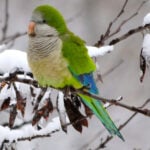 The Traveling BirdJune 26, 2025Can You Name 5 Parrot Species That Are Living Wild in the USA?
The Traveling BirdJune 26, 2025Can You Name 5 Parrot Species That Are Living Wild in the USA?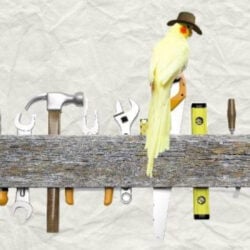 Bird BehaviorJune 26, 2025How is it Parrots Are Problem Solvers Social Animals and Even Use Tools?
Bird BehaviorJune 26, 2025How is it Parrots Are Problem Solvers Social Animals and Even Use Tools?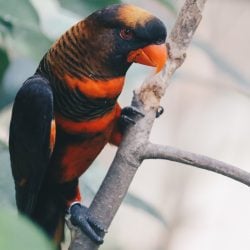 Bird & Parrot AnatomyJune 25, 2025How a Tiny Chemical Modification Makes Parrots Nature’s Living Paintings
Bird & Parrot AnatomyJune 25, 2025How a Tiny Chemical Modification Makes Parrots Nature’s Living Paintings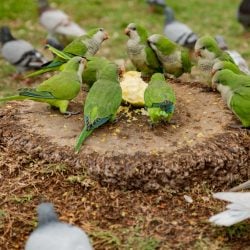 PigeonsJune 20, 2025How Do Parrots Thrive in Cities Outside Their Native Habitats?
PigeonsJune 20, 2025How Do Parrots Thrive in Cities Outside Their Native Habitats?
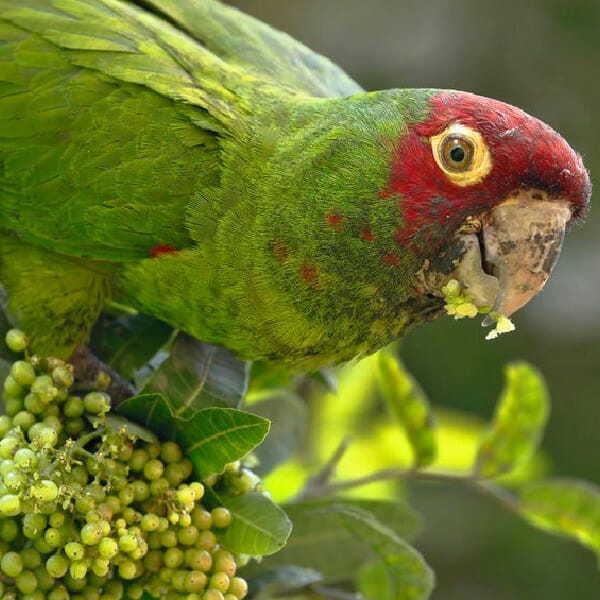
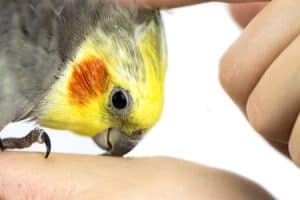


Linduh
18 Dec 2016Good morning. My Flock lov https://uploads.disquscdn.com/images/2db25247548dfdf631faf432bb3dce06ba0226157ed8130a5ecb774368d19785.jpg e their Rouybush natural pellets. My Budgie also likes carrots and broccoli. I have never seen him bathe, but he loves to help Sunny with hers..
jeanie
18 Dec 2016My budgies looove corn! It is their fav. But they do eat other vegetables. No fruit i have tried giving them banana apple melon but they won’t try it. Ill keep trying. Thank you for the info.
NAWalk
20 Dec 2016My budgies love the Roudybush nibbles size and crushed parakeet Nutriberries (I had an adopted budgie who lived to be 14 and when I got him at age 11 he had only eaten Nutriberries his whole life. They also love lacinato kale (whole leaves), broccolini florets, fresh corn, and green beans
martin13005
20 Dec 2016I have four budgies, and the girls like to take a spinach bath every day, sometimes more than once a day. The two boys MIGHT get their feet wet, and they call it good 🙂